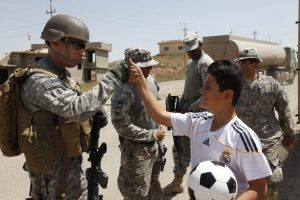By Sarah-Claire Jordan
 In every war since the Civil War, and even in wars before it, the U.S. has had to deal with language barriers somehow or another. Usually they got lucky and found some locals or even their own soldiers who were fluent in more than just English and could help with negotiations with the opposing forces or anything else that required translation or interpretation skills. The issue is, the demand changes depending on where the conflict takes place. During World War II, for example, languages such as French, German, Polish, and more were needed to be able to communicate with locals and the enemy as well.
In every war since the Civil War, and even in wars before it, the U.S. has had to deal with language barriers somehow or another. Usually they got lucky and found some locals or even their own soldiers who were fluent in more than just English and could help with negotiations with the opposing forces or anything else that required translation or interpretation skills. The issue is, the demand changes depending on where the conflict takes place. During World War II, for example, languages such as French, German, Polish, and more were needed to be able to communicate with locals and the enemy as well.
Now, the military needs speakers of Arabic, Kurdish, and other languages spoken in the Middle East and neighboring areas, as these are the areas where conflicts have occurred most recently. But how does the military deal with this huge demand for translators, interpreters, and linguists in general?
Enlisting Bilingual, Multilingual, and Linguistically Talented People
One of the simplest ways to deal with the issue of linguistic boundaries is to search for and encourage the enlistment of individuals who are either already fluent in the target language or languages, or individuals who are skilled at learning new languages. To determine this, applicants need to either take, and pass, the Defense Language Proficiency Test or the Defense Language Aptitude Battery. The first test is to determine fluency in any language the military needs translators for, and the second is to see how quickly and well an applicant could learn a new language if they don’t already know one.
Since it is much harder to learn a new language, translate, and interpret, these special soldiers get extra pay, usually a bonus for each language they know. They will use their linguistic skills for many different things, from communicating with locals to accompanying politicians to meetings to serve as their interpreter. They also have to be always alert and pay close attention to what locals say while they are in areas such as markets, for example, as valuable information can be gleaned from conversations between local people. Translation of radio broadcasts and newspapers in the target language are also tasks that these linguist soldiers must take on.
Hiring Translation Contractors
Outsourcing is another way the military deals with its linguistic challenges. Though it has a good number of soldiers who are linguistic specialists, they still need more help, especially as of late. These contractors either send translators and interpreters to wherever they are needed, or hire locals who speak English. Either way, these translators and interpreters get paid extremely well, for some obvious reasons. They generally will be in harm’s way much of the time, and it’s not unheard of for a contractor to lose translators to the conflict. Of course, the same goes for the soldiers with linguistic abilities, but at least they are trained in battle and are more or less prepared to deal with the possibility of injury or death.
While Alpha Omega Translations doesn’t work directly with the U.S. military, it is a company that knows the importance of breaking down language barriers in order to eliminate any confusion and facilitate communication between two or more parties or audiences. Alpha Omega Translations has translators that specialize in specific kinds of translation, as well as interpreters for in-person and over-the-phone interpretation. On top of that, DTP experts are available to localize your final translated product if needed.
For an overview of our translation expertise, visit our telephone interpreting service page



